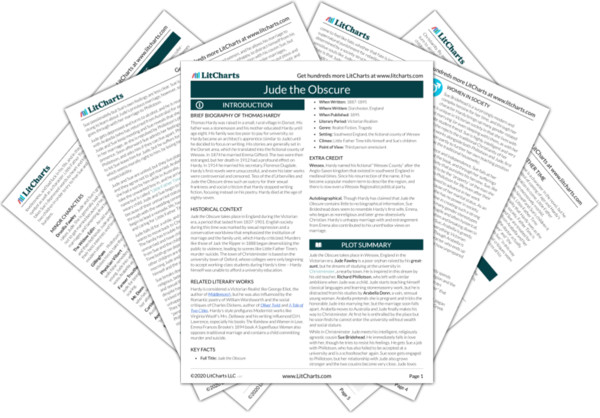Marriage
Much of Jude the Obscure consists of a critique of the institution of marriage, which Hardy saw as flawed and unjust. The novel’s plot is designed to wring all the possible tragedy out of an unhappy marriage, as Jude is first guilted into marrying Arabella by her feigned pregnancy, and Sue marries Phillotson mostly to make Jude jealous. Both protagonists immediately regret their decisions, and realize how a single impulsive decision can affect their entire…
read analysis of MarriageFate
Throughout the book Hardy subjects his characters to many hardships and unlucky coincidences which come to feel like fate, whether that fate is interpreted as a supernatural punishment for rebelling against religion or a fate determined by a society structured to thwart independent, sensitive souls like Jude and Sue. The novel’s overarching story of fate is that Jude and Sue’s family is “cursed” in marriage – both Jude’s parents and Sue’s parents were divorced…
read analysis of Fate
Women in Society
Sue Bridehead is a surprisingly modern and complex heroine for her time, and through her character Hardy brings up many gender-related issues. Sue is unique in Victorian society in that she lives with men without marrying (or even sleeping with) them, as with her undergraduate student friend. Sue is highly intelligent and very well-read, and she rejects the traditional Christianity of her society. She also works alongside both Phillotson and Jude, first marrying Phillotson…
read analysis of Women in SocietyReligion
Along with marriage and society, Hardy spends much of Jude the Obscure critiquing religion and the institution of Christianity. He often portrays Christianity as life-denying and belonging to “the letter” that “killeth” (from the novel’s epigraph). In contrast, Sue is introduced as a kind of pre-Christian entity, an ethereal, pagan spirit, and she first appears buying figures of the ancient Greek gods Venus and Apollo. Jude, meanwhile, hopes to join the clergy as part…
read analysis of Religion







Social Criticism
Much of the novel serves as a vessel for Hardy’s criticism of English Victorian society. Most of this critique is aimed at the institution of marriage, but Hardy also targets education, class divides, and hypocrisy. The early part of the novel involves Jude’s quest to be accepted into a college at Christminster, a university town based on Oxford. Jude works for years teaching himself classical languages, but he is never accepted simply because…
read analysis of Social Criticism